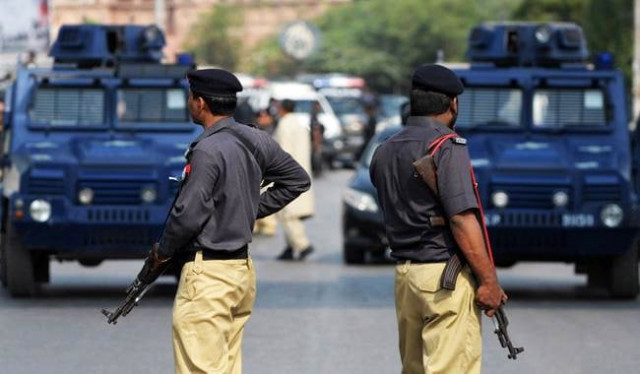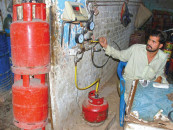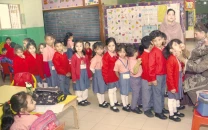Karachi cops look to 'community policing' for soft image building
Awareness efforts, mall security, anti-theft measures also being implemented as part of plan

Sindh police PHOTO: FILE
According to the "School Safety Division" (SSD) module, the South District Police have selected ten public and private schools where they have started classes for students, from Nursery to O levels, educating them about the role of the police, referring to them as "friends", and educating them about traffic signals, violations, and dealing with strangers.
South SSP Pir Mohammad Shah told The Express Tribune that they have selected highly qualified and trained police officers to take the classes in these schools. "We have developed different modules for different classes and have started taking classes in a few schools, which will be replicated in ten schools," he said.
According to the training module, the students will also be taught health tips, the risks of rash driving, drugs use and its repercussions, and how to report incidents to the police.
Sindh Police launch mobile app to report complaints
Anti-Affinity Theft Unit
Maid culture is built-in in our society. For some, it's a luxury, and for others a necessity. Robberies and theft, based on bonds of affinity, occur throughout Karachi but they are more prevalent in Defence and Clifton.
The police have named the unit tasked with dealing such cases as 'Affinity Theft'. Affinity thieves can be maids, nannies, helpers, drivers, gardeners, cooks, or any other domestic employee. They are the kind of people who will gain trust first and valuables afterwards.
According to the police, they have established an Anti-Affinity Theft Unit (AATU) headed by a veteran investigator from Darakshan Police Station. This unit has been raised to help, guide and assist victims, and has been a great success in working out such cases ever since its inception
In this connection, a Whatsapp group of housewives has been formed and kept active to keep the members posted on the developments about any incidences in the locality. A mobile app is also being developed to help employers upload information about maids and servants. This will save them the hassle of going to police stations to do the same.
According to South DIG, they will be stressing on community policing to achieve more effective and efficient crime control by reducing the fear of crime and improve quality of life, improving police services, and police legitimacy, through proactive reliance on community resources.
"The police is a product of community and it should work in proactive partnership with citizens to identify and solve their problems," South DIG said, adding that the communication gaps between the police and the community always create problems.
He said that they have started community outreach initiatives by starting pilot projects to provide relief to the community and will replicate the same in other places as well.
In this intervention, the police will also give tips to the students about harassments and how to deal with it. "We will arrange recreational activities for these students, take them out of the schools and to cinemas as well," South DIG Sharjil Kharal said, adding that the role of SSD is to ensure positive relationships and remove barriers between the school community and the police, which, according to him, will also reduce the incidence of crime and antisocial behaviour among youth.
"With this, the students will understand the law, the role and their responsibilities of the police to the community," he said. The salient feature of this intervention is that it will remind the kids that they are leaders, not followers, he added.
"It will restore respect for police in the community and decrease the number of future offences by concentrating on preventive measures. This will also help children to make good life choices, educate them on bullying and handling peer pressure and will mobilise them about safety measures," says a module copy available with The Express Tribune.
SWAT teams
The other intervention is about the safety of malls, which are a soft target owing to the crowds. With the intention of protecting malls, especially from terrorist attacks, South District police have raised a four-member Malls Liaison Unit to take on the challenge as a special weapons and tactics (SWAT) team in any eventuality. Whilst the unit concentrates on measures to counter terrorism, it will also work against other threats, such as theft, burglary and arson. Police have deployed their commandos as behaviour officers clad in plainclothes. They are a resource for the malls they are mandated to police -- always available to militate against the threat of terrorism and making South district less vulnerable to an attack.
"These commandos, who are present among common citizens, will respond to any threat within the malls' premises. They are well-oriented with entries, exits, corridors, passages, shops, lifts, CCTV command and control rooms, basements, and approaches to every floor," the SSP said, adding that the unit has already been deployed at Dolmen Mall, Ocean Mall and The Place.
"Mall administrations have welcomed the initiative and have provided lockers to the officers for keeping their articles under lock and key in malls," he said, adding that they would also replicate the same system in other malls.
PTI leader objects to curtailing power of Sindh police
Community police module
The "community police module" is now a part of "Sindh Police's Curriculum Development" programme and revised the syllabus of various promotional courses such as lower school, intermediate school, and upper school for probationer assistant sub-inspectors as well.
"This course has now become compulsory for the police. From constable to inspector level, all police staffers have to pass a 100-mark subject about community policing, otherwise, they would not be promoted to the next grade," said Iqbal Detho, a human rights expert who prepared the module. He added, "The aim is to improve their professional skills and educate them on community policing philosophies". He said that they have trained all the police master trainers at training centres across Sindh so that they can now do the teaching.
The community policing module comprises around 200 pages. National and international guidelines regarding community policing, community policing in cities and police station level, protecting human rights through community policing, standard operating procedure for community policing, community policing through gender-responsive approaches and countering extremism are among the areas covered in the training module book.



















COMMENTS
Comments are moderated and generally will be posted if they are on-topic and not abusive.
For more information, please see our Comments FAQ